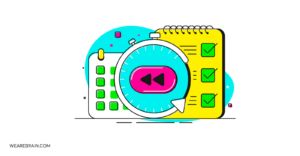Anastasiia shares her passion for the spoken word

We’re back with another instalment of our Brainiac Passions article series, where we find out more about our fellow Brainiacs and what inspires them to personal growth in their free time. It’s a great opportunity to learn more about the private lives of our work family and gives everyone in the office some insightful talking points when engaging in office banter by the water fountain. Jokes, we don’t have a water fountain – we have a liquor cabinet. More jokes.
This week we had a great chat with Anastasiia, our UX intern and resident linguaphile, to find out more about her love for foreign languages. Here’s what she had to say – well, the parts we understood in English:
Q: So we heard a rumour in the office that you speak 6 languages – is that true and what are they?
Yes, that’s true. I speak Russian, Ukrainian, English, Dutch, Portuguese and French.
Q: Woah impressive! What’s the story behind you knowing how to speak so many different languages?
Well, Ukrainian and Russian are my native languages. Most people from Ukraine speak both, so that doesn’t make me very unique. I started learning foreign languages at a pretty young age. I think I was 5 when English was introduced to me at kindergarten. Because I was learning new words pretty quickly, my mother decided to put me in a special language class where learning foreign languages was the main focus. We had at least 5 hours each week of regular English classes, which also consisted of special additional English literature and technical translation classes. Each week we learned new terminology from different fields, such as medicine and engineering.
French was the second language we had to study at school. For around 5 years we had 3 hours per week of French. Sadly, I haven’t practiced French for almost 6 years so I’m starting to forget a lot of words and syntax. But my goal for this summer is to regain my knowledge of the French language!
I started learning Dutch at the end of 2014 when I moved to The Netherlands. In order to get to university and be able to study in Dutch, I had to undergo an intensive Dutch language course for a year and a half to gain the required level of the university.
With regards to learning Portuguese, honestly, I don’t even know how that happened. I’ve never practiced, but I have a lot of Brazilian friends and I’ve spent pretty much all of my time with them and their families. Probably because Latin moms can be very pushy (no surprise to anyone!) they only ever spoke to me in Portuguese until one day I just started to understand everything they were saying. Later on, I even started to talk back.
Also, when I came to The Netherlands I started to learn Spanish (at school) and Polish (I had a lot of Polish friends). However, it never became anything serious so I just learned the basics.
Q: Have you always enjoyed learning languages? What do you find most fascinating about languages in general?
Yes, I have always enjoyed learning new languages. To me, when you learn a new language it feels like you start understanding different cultures – not only their language, but also their history and traditions. Speaking multiple languages kind of makes you feel like a local no matter where you are or where you are from.
Q: How do you go about learning a new language? Do you have any tips or tricks you could share?
It just comes very naturally to me and it may not be the case for others. If I feel motivated enough, I know I can learn any language. For this, I have to thank my mom for noticing my talent at a young age and motivating me to become better by giving me new opportunities.
As for tips, the best thing you can do is practice, practice and practice. Watch your favourite movies and series or read your favourite books in a foreign language. Also, talk to foreign people and don’t be scared to make mistakes. Only by making mistakes can you truly learn.
Q: What is your favourite language and why?
I would have to say Dutch is my favourite because it was the hardest for me to learn. It felt like one of the biggest challenges of my life because I had to gain level B2 efficiency in a pretty short period of time. I must be honest, there were even quite a few teachers who didn’t believe I could do it. I didn’t pass the exam the first time, but I didn’t give up and kept studying even harder to prove to myself and everybody that I could do it. I passed on my second attempt, so there! And now, after living in the Netherlands for 5 years, it sometimes feels to me like my Dutch is better than my native languages.
Also, if I didn’t learn Dutch I would not have been able to study for my Bachelor degree at university, and I would never have discovered my passion for UX design.
Q: Is there a language you want to learn but haven’t yet?
No, no specific language – I think 6 is enough for now! However, when I was 12 years old I kept telling everyone that one day I will be able to speak 10 languages. 10 years have since passed and nothing has changed, I still want to speak at least 10 languages before my 40th birthday. Wish me luck!
Thanks for the chat Anastasiia! It was really great getting to know more about your love for languages. Good luck with learning the next 4 languages! Veel succes!
Paula Ferrai
Working Machines
An executive’s guide to AI and Intelligent Automation. Working Machines takes a look at how the renewed vigour for the development of Artificial Intelligence and Intelligent Automation technology has begun to change how businesses operate.







